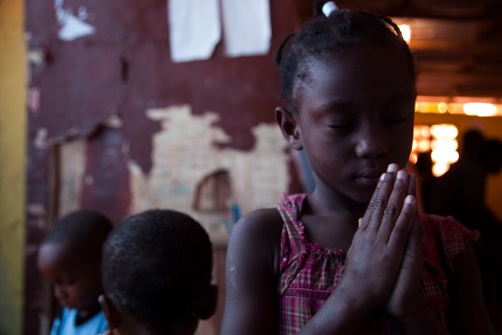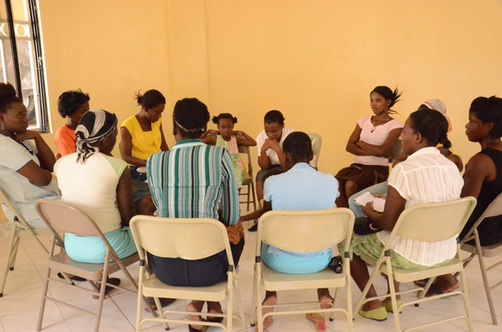Plagued by frustration and insufficient security, Haiti’s Internally Displaced Person (IDP) camps are now the breeding ground for rape and sexual violence against women, young girls, and even infants. Gender-based violence was already a problem in Haiti. However, according to KOFAVIV (which stands for Commission of Women Victims for Victims in Creole), a grassroots organization established by and for rape survivors from the poorest areas of Port-au-Prince, there has been an alarming increase of sexual violence and forced prostitution in the camps since the January 12, 2010 earthquake.

Photo Ben Horton
With the help of an interpreter, I spoke to Josie Philistin, 38, a director at KOFAVIV and a survivor of three sexual assaults. She and others in the organization work to raise awareness, advocacy and outreach about the growing sexual violence problem in the camps and in the communities. “You find in the camps all kinds of people, gangsters, people who fled from prison. They [the aid workers] setup areas for food and water, but protection was not a main concern.” It is reported that there are thousands of convicted criminals on the streets, including rapists, who escaped the crumbling National Penitentiary during the quake. Many of these prisoners are gang members and warlords that are now heavily armed with weapons they are suspected of stripping from the prison guards during their escape. Philistin describes the camps as dangerous and dark at night providing little protection for women and young girls, especially those living alone. The danger is compounded when you add in the lack of consequences for the perpetrators due to inadequate state infrastructure. “The environment is very dehumanizing and degrading,” said Philistin. “Not only is there little security in the camps, but they [the perpetrators] know that if they do something, they will get away with it.”
KOFAVIV reports that 65% of the victims of sexual violence are minors and since the earthquake, they are seeing more children and babies who have been raped. However, it is difficult to know exactly how many cases there are of sexual violence. Few women have the courage to report the crime because the attacker usually threatens to kill either them or their family members. KOFAVIV’s network of approximately 60 community agents, including men, do their best to locate and help rape victims who otherwise would not have access to support. The agents work in the region’s 22 camps conducting training in order to sensitize the communities and provide information about the psycho-social, legal, and medical services KOFAVIV offers.
In June of 2011, UNHCR partnered with KOFAVIV to run a pilot safe house project for survivors of rape and forced prostitution in Port-au-Prince.
Another organization supporting the humanitarian efforts in Haiti is United Nations High Commissioner for Refugees (UNHCR). In order to better understand the situation, the United Nations refugee agency interviewed women from 15 of the camps that were believed to be at risk of undertaking sexual exchanges in order to survive in IDP camps. The study found that “women are exchanging sexual favors - transactional sex - to receive food and benefits, whether coupons (even if most of these women did not precisely know what the coupons were for or what type of commodity they would give access to), direct access to distributions, a place on Cash for Work schemes, money or simply a plate of spaghetti.” All the women interviewed claimed that they had not resorted to transactional sex before the earthquake. They were forced into it by the overtly corrupt, self-proclaimed IDP committee leaders through which non-governmental organizations (NGOs) and humanitarian donors are channeling aid.
In June of 2011, UNHCR partnered with KOFAVIV to run a pilot safe house project for survivors of rape and forced prostitution in Port-au-Prince. One of the first beneficiaries is Sarah (her name has been changed for her protection). Sarah, 29, had lived in an IDP camp with her two children, 10 and 7 years old. Through an interpreter, she told me that her children’s father was killed during the earthquake and she was left alone to care for her family. “Life was very bad in the camp. I had no tent, just sheets that were hung up by one of my friends,” remembers Sarah. “Women are never treated well in the camps in my opinion. For instance, when humanitarian aid is being delivered, women will never be given priority to receive it. They will be forced to sleep with whoever is in charge of distribution or provide different kinds of services in exchange for access to the humanitarian aid.” Sarah’s biggest worry wasn’t just getting enough food to feed herself and her children daily, she was also afraid for her and her children’s safety. “I never felt safe in the camp,” Sarah explains. “There were bandits and gagsters coming in and out of the camp, slashing tents, and stealing whatever people had.” One night, Sarah’s fears came true when she was attacked by four men. She was raped by two of the attackers before she was able to escape. She never reported the incident because she was scared and embarrassed. “After the rape, I was so ashamed and I didn’t want word to spread of what happened, so I stopped going out,” said Sarah. In Haitian culture it is not the rapist who reaps shame and scorn, but the woman. Due to this social stigma, women are scared to tell anyone they have been raped in fear that they would be shunned.

Photo Courtesy C.Tooze/UNHCR
Sarah’s life changed when she met some people at a camp who took her to KOFAVIV. She was given the opportunity to move into the safe house established by UNCHR. Sarah lived in the safe house with her children for six months. There she received health training, psychological support and business training. More importantly, her children are able to attend school through funding provided by UNHCR. “When I moved into the safe house, I was a little shy. I felt a difference feeling safe in the safe house and I could see the difference in my children’s faces too.” Building a community is crucial for the survivors. The 15 women and their families that live in the safe house cook, eat, and take classes together. “Because social infrastructure was destroyed, building solidarity and community…is a big part of the women’s recovery,” said Charity Tooze, UNHCR Senior Communications Officer.
Today Sarah and her children have moved into their own one room apartment that UNHCR helps pay for until she can earn her own money by starting a small business. “We have just secured the community warehouse for the safe house project,” said Tooze. “This is where women, like Sarah, will go with their voucher to buy their goods, like shoes or cosmetics, to resell them in a market near where they live. The goal is after six months to a year the women will make enough money to cover their rent and be self-sustaining.”
Though there are several organizations in Haiti working to empower women, the greatest urgency remains. Hundreds of thousands are still living in camps with no relief in sight. Philistin’s dream for the New Year is that there will be synergy between the Haitian government, international community, and the local organizations to help women. For Sarah, her dream may have already come true. “I am most grateful that my children get to play with other children and we can eat on a daily basis,” she said with a certain calm and strength in her voice.

WOW to write for NG. Good article. Haiti’s still in turmoil and this and many other articles prove teh point. We still need to help them
How terrible that women should be sujected to such treatment, right in the place one would suppose they should be safe. Thank goodness for KOFAVIV and its efforts.